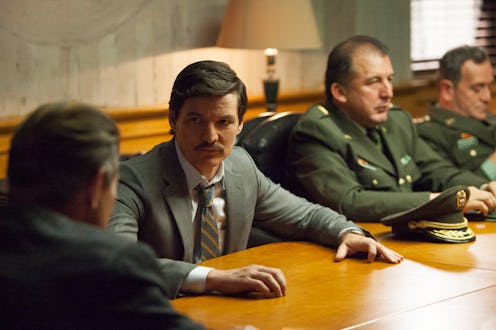Entertainment
‘Narcos’ Goes Deep Into The History Of An Even More Lucrative Drug Cartel

When Narcos premiered its first season in 2015, the primary focus of the series was following Pablo Escobar and the law enforcement agencies that tried to take down his drug empire. In its season season, Narcos showed the death of its star and main antagonist. The first two seasons of Narcos took some creative freedoms with the true story, but was still based in the fact, rounding out its cast with dramatized versions of other individuals who orbited the kingpin. Season 3 of Narcos premieres on Sept. 1. And now that Escobar is permanently out of the picture, will Narcos still stick to the truth, or branch out into invention? How accurate is Narcos Season 3?
Showrunner Eric Newman admitted to The Hollywood Reporter that when it comes to historical accuracy, the show is "probably 50-50" split between fiction and truth. "The chronology is accurate," he said. "We try to cover as many of the events as we could. Even when we had to stray from reality, we tried to be consistent with what the reality would be and how people would react to things."
With that proportion in mind, Newman and the rest of the Narcos team have already told a fairly accurate story with Escobar at the center, from his rise to his fall. So it's likely Narcos will be doing the same as the series continues, shifting focus to the Cali Cartel, which stepped up and took Escobar's Medellin Cartel's place as the world's leading cocaine traffickers.
Narcos Season 3 will show that the Cali Carter didn't just replace Escobar — they forced the DEA to completely change their approach to try and take them down. What the Cali Cartel lacked in headlines and personality, they made up for in cunning and efficiency.
Escobar's Medellín Cartel was famously ruthless and violent, and the Cali Cartel learned from his mistakes. They attempted to hide their drug trading through legitimate businesses, making it more difficult for law enforcement agencies to track them. Former DEA agent and Narcos consultant Chris Fiestl told The Q that "Between the four [heads of the Cali Cartel], they owned well over 6,000 pieces of property. At one point, at their height, they were responsible for 40 percent of the economic development in Cali."
While the series seems devoted to following the true events as much as they can, that "50-50 split" leaves a lot of room for events to be created or dramatized beyond reality. Many of the broader narrative strokes of Narcos are certainly true, specifically when certain characters die and when major cartel-related events occurred. But beyond that, the events as they are portrayed on the show should be taken with a grain of salt.
Despite the ability that Narcos has to make things up, many of the most unbelievable elements of the show are also the most accurate. Specific conversations may be entirely fictional, but the Cali Cartel really did make $22,500 every 30 seconds. Four people, including two brothers, really did run the entire operation as though they were a board of directors.
Narcos may not be the most accurate portrayal of the Cali Cartel available, but marathoning Season 3 should be an effective and entertaining way to learn about the crew who stepped up and took Pablo Escobar's place in the international drug trade.